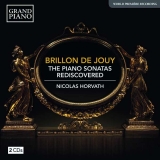 Anne-Louise Brillon de Jouy: Klaviersonate a-Moll + Klaviersonaten Nr. 1-12 (Troisième Recueil de Sonates pour le Pianoforte avec Accompagnement ad libitum); Nicolas Horvath, Klavier; 2 CDs Grand Piano GP872-73; Aufnahme 10.2020, Veröffentlichung 09.04.2021 (118'55) – Rezension von Remy Franck
Anne-Louise Brillon de Jouy: Klaviersonate a-Moll + Klaviersonaten Nr. 1-12 (Troisième Recueil de Sonates pour le Pianoforte avec Accompagnement ad libitum); Nicolas Horvath, Klavier; 2 CDs Grand Piano GP872-73; Aufnahme 10.2020, Veröffentlichung 09.04.2021 (118'55) – Rezension von Remy Franck
Der Amerikaner Benjamin Franklin (1706-1790) war einer der vielseitig begabtesten Männer in der amerikanischen Geschichte, Schriftsteller, Philosoph, Wissenschaftler und Erfinder, sowie Politiker. Als solcher kam er zum Ehrentitel ‘The First American’, wegen seines Einsatzes für die amerikanische Einheit. Als einer der Gründerväter der Vereinigten Staaten beteiligte er sich am Entwurf der Unabhängigkeitserklärung und war einer ihrer Unterzeichner. Er war auch der erste Botschafter der USA in Frankreich. Und damit sind wir am Schnittpunkt angelangt, wo eine Beziehung zu der vorliegenden Neuerscheinung von Grand Piano erstellt werden kann.
Franklin war nämlich auch Musiker. Er spielte angeblich Violine, Harfe und Gitarre. Er trug maßgeblich zur Entwicklung der Glasharmonika bei, und Mozart sowie Beethoven komponierten Stücke für Franklins Glasharmonika. Kein Wunder, dass er auch in einem der vorrangigen Musiksalons von Paris verkehrte, dem von
Anne-Louise Brillon de Jouy (1744-1824) in Passy, damals noch eine eigenständige Gemeinde nahe Paris am rechten Ufer der Seine. (1860 eingemeindet, gehört sie heute zum 16. Arrondissement). Sie und Franklin unterhielten auch einen ausgiebigen Briefaustausch. Und dieser wiederum initiierte Forschungen der American Philosophical Society, wodurch auch vieles über die in Europa in Vergessenheit geratene Musikerin bekannt wurde.
Die in Paris geborene Anne Louise Boyvin (Brillon de Jouy war der Name ihres Mannes) galt als vorzügliche Cembalistin und Pianistin. Luigi Boccherini sagte von ihr: « Sie ist eine der größten Cembalospielerinnen in Europa » und widmete ihr seine Sechs Sonaten für Klavier und Violine op. 5.
Madame Brillon starb im Alter von 79 Jahren in Villers-sur-Mer, Calvados.
Ihre auf dieser CD erstmals eingespielten dreizehn Sonaten repräsentieren ihre gesamte Musik für Klavier solo und sind technisch ebenso beachtenswert wie phantasievoll. Sie sollen, dem amerikanischen Musikwissenschaftler Bruce Gustafson zufolge, zwischen 1775 und 1783 entstanden sein, zum Teil sicherlich schon für das Pianoforte. Die Musikwissenschaft konnte feststellen, dass Mme Brillon de Jouy ein englisches Pianoforte besaß, das ihr Johann Christian Bach aus London geschickt hatte, sowie ein deutsches Pianoforte und ein Cembalo.
Nicolas Horvath spielt die Sonaten mit sehr viel Leichtigkeit, flüssig und ungekünstelt schlicht, was besonders den langsamen Sätzen zugutekommt. Die Aufnahmeregie hat für einen direkten und relativ trockenen Klavierklang gesorgt, der für dieses Repertoire passend ist.
American Benjamin Franklin (1706-1790) was one of the most multi-talented men in American history, writer, philosopher, scientist and inventor, as well as politician. As such, he came to the honorary title of ‘The First American’ because of his commitment to American unity. As one of the Founding Fathers of the United States, he participated in the drafting of the Declaration of Independence and was one of its signers. He was also the first U.S. ambassador to France. And this brings us to the intersection where a relationship can be established with this new release from Grand Piano.
Franklin, after all, was also a musician. He reportedly played the violin, harp and guitar. He contributed significantly to the development of the glass harmonica, and Mozart as well as Beethoven composed pieces for Franklin’s improved instrument. Not surprisingly, he also frequented one of Paris’ premier music salons, that of
Anne-Louise Brillon de Jouy (1744-1824) in Passy, then still an independent commune near Paris on the right bank of the Seine. (It was not incorporated until 1860 and is now part of the 16th arrondissement.) She and Franklin also maintained an extensive exchange of letters. And this in turn initiated research by the American Philosophical Society, which also revealed much about the musician who had been forgotten in Europe.
Born in Paris, Anne Louise Boyvin (Brillon de Jouy was her husband’s name) was considered an excellent harpsichordist and pianist. Luigi Boccherini said of her, « She is one of the greatest harpsichord players in Europe » and dedicated his Six Sonatas for Piano and Violin, Op. 5, to her.
Madame Brillon died at the age of 79 in Villers-sur-Mer, Calvados.
Her thirteen sonatas, recorded for the first time on this CD, represent all of her music for solo piano and are as technically noteworthy as they are imaginative. According to the American musicologist Bruce Gustafson, they are thought to have been written between 1775 and 1783, some of them certainly already for the pianoforte. Musicologists have been able to determine that Mme. Brillon de Jouy owned an English pianoforte that Johann Christian Bach had sent her from London, as well as a German pianoforte and a harpsichord.
Nicolas Horvath’s performance is light, fluid and impresses with unaffected simplicity, which is especially beneficial to the slow movements. The recording crew has provided a direct and relatively dry piano sound, which is appropriate for this repertoire.






















